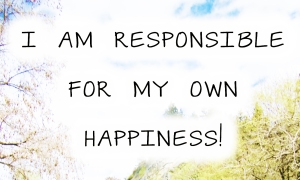This article is the first in a proposed series about Happiness, the modern research about it and ways to cultivate it.
Part 1: Starting to think about Happiness
What comes to your mind when you hear the word happiness? Is it a beautiful memory? Is it a memorable achievement? Or is it a happy face? Well, happiness can come to us in many ways and we associate different things with it.
What I want to do is to introduce you to ideas and practices that can increase your happiness to a whole new level. These ideas and techniques are backed by scientific evidence put up by people who have dedicated their whole lives to understanding the different dimensions of happiness and its importance in our individual lives as well in societies and nations.
First of all, what is Happiness?
The word Happiness can be used in a number of ways. When a person says s/he is happy s/he:
1) Maybe referring to his/her general outlook of life. We say we are happy if we feel satisfied with our lives. This level of satisfaction is a strong indicator of happiness and it helps scientists quantify and measure happiness. Simply put, happiness is being satisfied with your life.
2) Maybe referring to a particular sensation. For example, suppose the weather remained rainy for three straight days which made you sad because you could not go to a place that you were longing to go. Now if the fourth day turns out to be sunny and you are able to visit your favorite place then you will feel a sensation of happiness because your wish turned into reality giving you joy.
Positive psychology researcher Sonja Lyubomirsky elaborates, describing happiness as “the experience of joy, contentment, or positive well-being, combined with a sense that one’s life is good, meaningful, and worthwhile.”(The How of Happiness, 2007)
The words meaningful and worthwhile in the above definition are quite important. In the past philosophers used to think of happiness as the outcome of lives lived purposefully. But in the modern definition the meaning of happiness changed to a certain degree and it came to be looked upon as something “out there” that could be pursued, caught, and consumed. Happiness has increasingly been thought to be more about getting little infusions of pleasure, about feeling good rather than being good, less about living the well-lived life than about experiencing the well-felt moment.
Don’t get me wrong, there is nothing bad about feeling good. But I would suggest that something of value may have been lost or forgotten in our transition to modern ideas of happiness. We can’t feel good all the time; nor, I think, should we want to. Nor should we assume that happiness can be had (maybe a better word?) without a certain degree of effort, and possibly even sacrifice and pain.”(Darrin M. McMahon, Happiness, A History)
I hope that by now you are getting an idea of what happiness is and how it is thought of. Now I want to discuss the idea further that why pursuing happiness all the time is not only futile but also dangerous. Yes, you read it right, pursuing happiness all the time can be dangerous. Here is how:
1.It makes us take unnecessary risks:
Studies have shown that moderate levels of happiness and beneficial for creative think and problem-solving but when experienced in excess happiness can reduce the creative thinking ability of the person. Furthermore, it leads to risk taking that is unnecessary and dangerous. For example, it can lead to “overlook or neglect warning signs in their environment, or take bold leaps and risky steps even when outward signs suggest gains are unlikely.
People in this heightened ‘happiness overdrive’ mode engage in riskier behaviors and tend to disregard threats, including excessive alcohol consumption, binge eating, sexual promiscuity, and drug use.”
2. Happiness is not suited to every situation
We humans experience a variety of emotion namely anger, anxiety, boredom, anger, love, happiness etc These emotions guide our thinking in different contexts and situations, for example, fear helps us anticipate some danger.
Happiness is useful in its own domain. It helps us work towards some goal and then feel good about them when they are achieved. But it can hurt us too. Happiness can actually hurt us in competition. Illuminating studies done by Maya Tamir found that people in a happy mood performed worse than people in an angry mood when playing a competitive computer game.
3. Not all types of happiness are good for you.
Happiness is a single word, but it can refer to several feelings. One of them is pride. It is a pleasant feeling associated with elevated social status or achievement. Although pride makes us feel good about ourselves yet it has been seen that when we experience pride without genuine merit it can lead to antisocial behavior and aggressiveness. It can also hinder our ability to think what the other person is going through emotionally right now.
4. Pursuing happiness may actually make you unhappy.
Is pursuing happiness healthy? Groundbreaking work by Iris Mauss has recently supported the counterintuitive idea that striving for happiness may actually cause more harm than good. In fact, at times, the more people pursue happiness the less they seem able to obtain it. Mauss shows that the more people strive for happiness, the more likely they will be to set a high standard for happiness—then be disappointed when that standard is not met. This is especially true when people were in positive contexts, such as listening to an upbeat song or watching a positive film clip. It is as if the harder one tries to experience happiness, the more difficult it is to actually feel happy, even in otherwise pleasant situations.
How to find healthy happiness?
But how exactly can we attain a healthy dose of happiness? This is the million-dollar question.
First, it is important to experience happiness in the right amount. Too little happiness is just as problematic as too much. Second, happiness has a time and a place, and one must be mindful about the context or situation in which one experiences happiness. Third, it is important to strike an emotional balance. One cannot experience happiness at the cost or expense of negative emotions, such as sadness or anger or guilt. These are all part of a complex recipe for emotional health and help us attain a more grounded perspective. Emotional balance is crucial.
Finally, it is important to pursue and experience happiness for the right reasons. Too much focus on striving for happiness as an end in itself can actually be self-defeating. Rather than trying to zealously find happiness, we should work to build acceptance of our current emotional state, whatever it may be. True happiness, it seems, comes from fostering kindness toward others—and toward yourself.
The text above is based on work by: June Gruber, Ph.D., an assistant professor of psychology at Yale University, the director of the Yale Positive Emotion and Psychopathology Laboratory, and a licensed clinical psychologist. She was recently named a “Rising Star” by the Association for Psychological Science.

